The Story of Classical KUSC
Once a small student-run station broadcasting from the University of Southern California campus, KUSC is now the largest and most listened to public radio and non-profit classical music station in the United States.
Our Roots
The plans for KUSC were hatched near the end of WWII in bustling downtown Los Angeles. At the time, Los Angeles was the nation’s capital for radio and motion picture production — and television was on the rise.
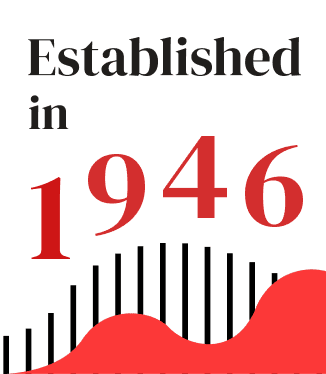
1946
Thanks to a generous gift from USC alumnus Captain George Allan Hancock, an oil magnate and cello player for the Los Angeles Symphony Orchestra, USC was able to build a 250-foot radio tower atop the Hancock Foundation building on campus. Students began broadcasting October 24th on an FM band that was so new, they identified themselves as “Frequency Modulated KUSC Radio.”
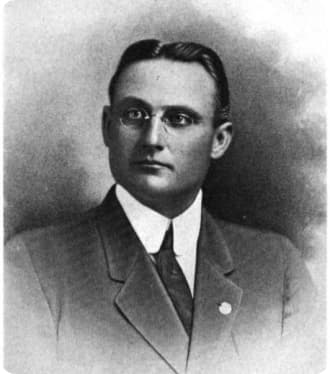

1947
Officially Launched on the Radio
Though limited to a 10-mile radius from the USC campus, more than 1,000 students nationwide applied for admission to the USC radio department. Radio Life noted in its August 17th issue that USC was “the first privately endowed institution in American educational history to own and operate its own radio station and the first to operate both AM and FM stations.”
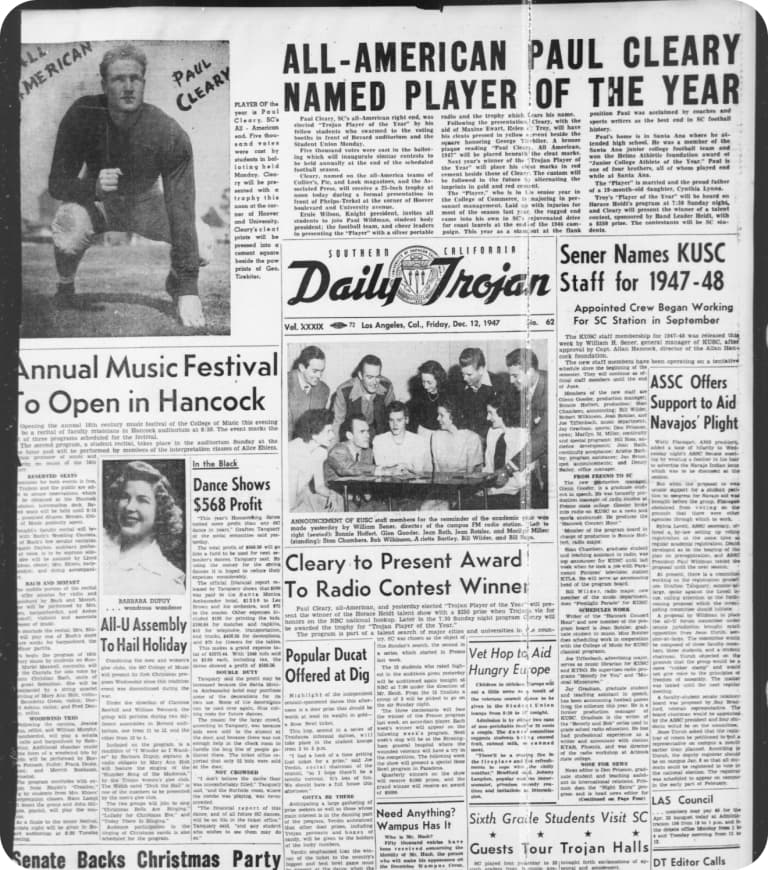

1973
We became the first professional full-time classical radio station
Wally Smith, a graduate student finishing his doctorate in communication at the university, became the station’s General Manager. After studying the Los Angeles radio market, Smith recognized an outstanding opportunity just waiting to be seized. “It was very clear to me that what this city needed and what public radio was uniquely suited to do was a really serious full-time classical music radio station,” he said. KUSC went all-classical on April 2nd and would soon set the national standard for classical music radio.
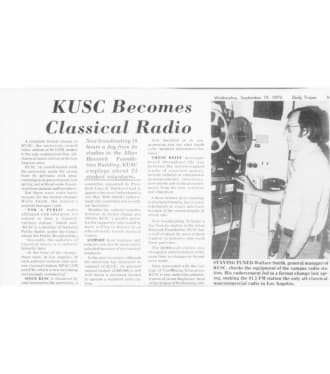

1976
The Corporation for Public Broadcasting awarded KUSC a five-year, $750,000 major market expansion grant — the first such grant in the nation. The funds helped attract major audiences to public radio and established a downtown L.A. space for full-time professional announcers, producers and engineers. KUSC also signed on in stereo from its new transmitter on Lookout Mountain above Hollywood, expanding its audience potential to 12 million people.”
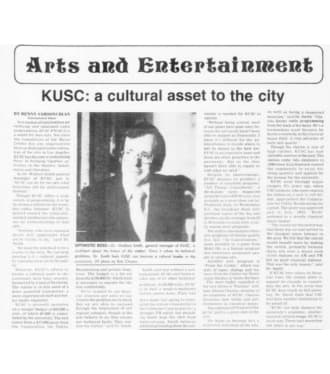

1978
Largest audience of any public radio station in the country
KUSC was on the air 24 hours a day with the largest audience of any public radio station in the country. At this point, the station had become a full-fledged production center, broadcasting Carlo Maria Giulini’s first season as conductor of the Los Angeles Philharmonic.
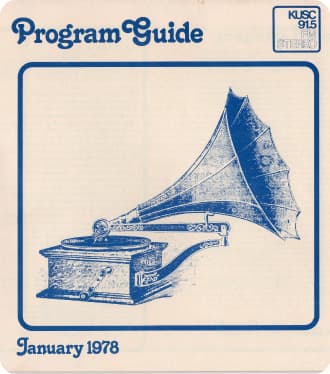

1980
KUSC became the first public radio station in Southern California with an up-link satellite earth station, which allowed it to beam programs via satellite to other public radio stations across the country.
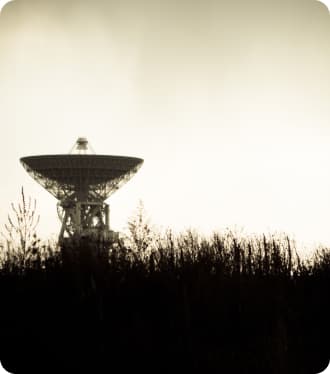

1982
KUSC begins to expand, acquiring KCPB, which introduced new audiences in Thousands Oaks and Ventura County to KUSC. Fun fact: This was also the year George Lucas gave KUSC the radio serialization rights to Star Wars, which was co-produced with NPR.
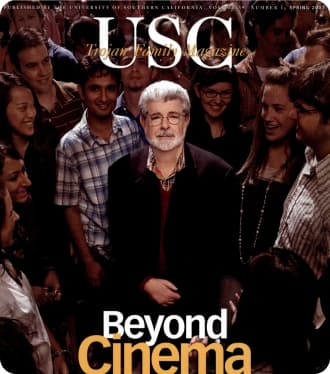

1984
Just in time for the 1984 Olympics, based in L.A., KUSC became a "superstation" by acquiring two stereo channels on an earth-orbiting satellite and broadcasting the Olympic Arts Festival live to the nation.
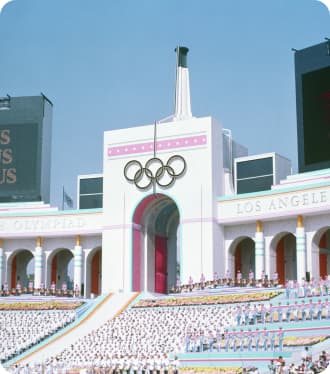

1985
We began expanding geographically within SoCal
KUSC expands into Santa Barbara. Years later, KUSC worked with multiple radio stations to preserve the legacy and keep classical music on historic 93.7 FM KDB in Santa Barbara.
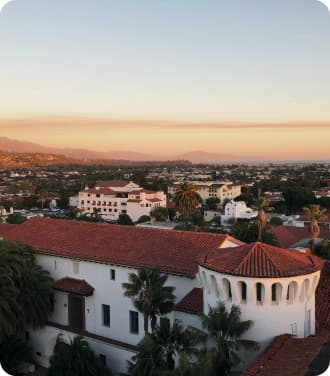

1988
KUSC's third sister station, KPSC Palm Springs on 88.5FMcame online when it was granted a license to construct a new station that would serve the desert communities far east of Los Angeles.


1996
After experimenting with a newer, more eclectic mix of classical, jazz, folk and world music, KUSC returned to its roots with an all-classical format. In December, the station celebrated Beethoven's birthday by filling the airwaves with the composer's music and influences for a full week. That same month, listeners generated a landmark $410,640 in 10 days of fundraising, including a then-record $78,402 in a single day.
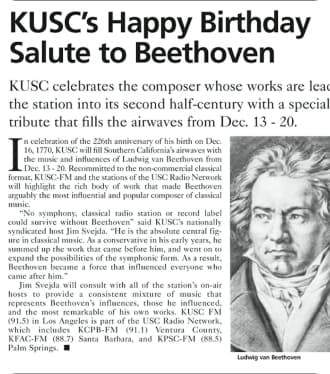

2007
The only full-time FM classical station in SoCal
KUSC became the only full-time FM classical station in Southern California and raised a record $1.3 million during its Fall on-air membership drive. KUSC also produced the first live Los Angeles Opera broadcast since the company's inaugural season.
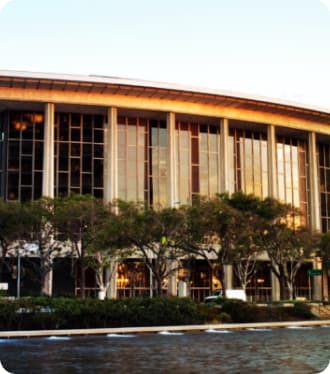

2009
KUSC expands into the central coast with a new signal in Morro Bay.


2010
Classical KUSC moved into what is now the iconic, 32-story USC building in heart of downtown Los Angeles.
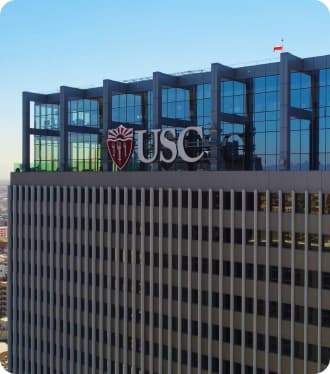

2020
KUSC partners with the Los Angeles Philharmonic Orchestra and Gustavo Dudamel to launch a new series, "At Home with Gustavo", a one-hour program featuring handpicked music from the superstar conductor. Gustavo joined KUSC’s Brian Lauritzen to play his selections and discuss why these personal music choices are important to listen to in a time of social isolation. The series continued with other notable guests such as Esa-Pekka Salonen, John Adams, Yuja Wang, Thomas Wilkins, Ray Chen, Jean-Yves Thibaudet, Susanna Mälkki, John Williams, Musicians of the LA Phil, and a Spanish-language version featuring Gustavo and his wife María Valverde.
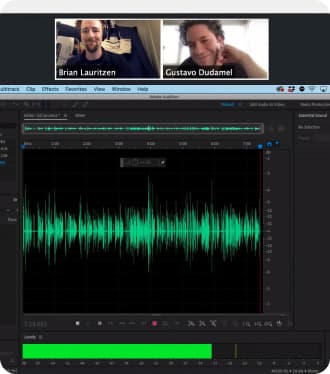

2021
Lara Downes joins KUSC’s digital team as Resident Artist and as a vibrant creative force in digital productions, offering audiences new and exciting moments of discovery.


2021
KUSC celebrated our 75 years of anniversary
KUSC celebrates 75 years on the air, looking toward the future while nurturing a love of classical music for all.


2022
After being sister stations since 2011, KUSC in Los Angeles and KDFC in San Francisco began to be known together as Classical California. The 10 station network across the state all became part of this new brand as well as the many new digital content offerings.
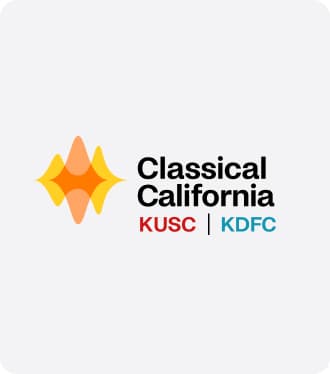

Our Mission Today
We make a positive impact on individuals and communities by championing the power of classical music
